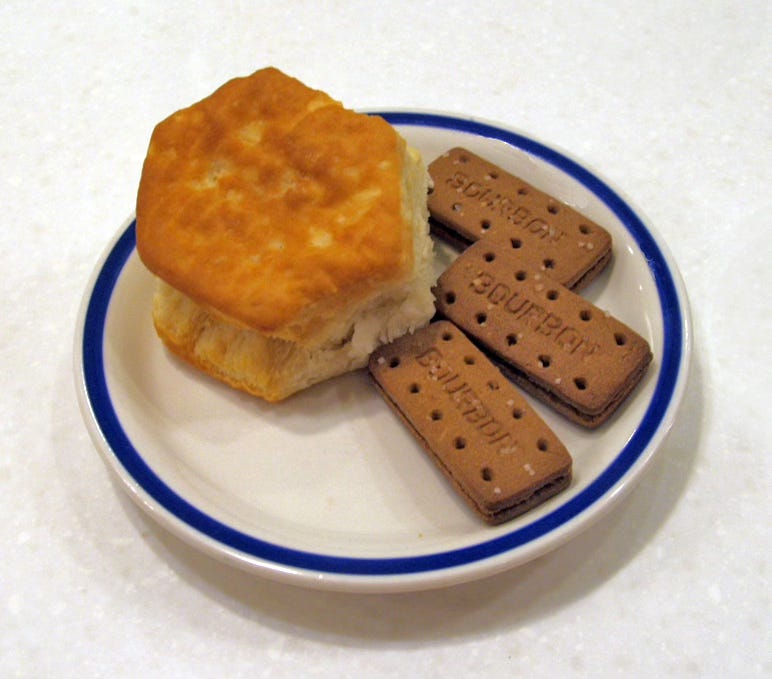Biscuit Day: Why Do Japanese Cars (and Appliances) Talk So Much?
Why February 28 Is Biscuit Day (And What Your Japanese Car Has to Say About It)
You learn a lot when you own a Japanese car. Most of it trivial, but the learning never stops.
Take my Japanese-speaking Kiwi friend, for example. The other day, he got into his imported Nissan Leaf, turned the ignition on, and was greeted by a pleasant female voice:
"今日は2月28日です。ビスケットの日です。"
"Kyo wa nigatsu nijuhachi-nichi desu. Bisuketto no hi desu."
"Today is February 28. Biscuit Day."
Biscuit Day!
A day for all things biscuit in Japan! What more could we want?
Alas, the soothing Japanese voice failed to answer the age-old question: are we talking about proper biscuits, or the scone-like monstrosities Americans call biscuits1?
Both, apparently.

But why biscuits? And why the need to inform us?
Why Do Japanese Cars Talk?
This wasn’t the first time someone had asked me why their Japanese car insists on speaking. The simple answer? Japanese cars love to talk to you. Something about being polite and hospitable or something.
In fact, if you’ve ever walked down a street in New Zealand, you might have suddenly heard:
右に曲がります。ご注意ください。
"Migi ni magarimasu. Go chui kudasai."
As if oblivious Kiwis were expected to understand that the truck was turning right and heed the warning.
But it’s not just cars.
It’s appliances too.
For example, my stove informs me when the timer is up or if I’ve spilled something. My bath plays a cheerful jingle and announces when it’s full.
Forget Japanese toilets.
Japanese baths are where it’s at. The auto-filling feature?
Life-changing!
The talking though? The talking we can do away with.
Unless, of course,
it’s telling me about Biscuit Day.
Which begs the question, why is February 28 Biscuit Day?
I was intrigued, so I looked it up. It turns out that the answer, as always in Japan, lies in the date.
If you know Latin, French, or the etymology of biscuit (anyone? genuinely curious), you might already see where this is going.
Biscuit comes from bis coctus—bis meaning twice, coctus meaning baked. The French cuit also means baked.
Twice-baked = bis cuit!
Now, let’s break down February 28, the 28th day of the second month of the year (for those who forgot).
In Japanese, 2 is ni. Two 2s? That’s 2 times 2—a nod to the twice-baked process.
But what about the 8? Well, another reading of 8 is ya (as in Yakuza). And yaku also happens to be the Japanese word for “to bake.”
See where this is going?
2-2-8 = Twice-baked = bis cuit!
And if that wasn’t weird enough, according to the National Biscuit Organisation of Japan (yes, that’s a thing), February 28, 1855, was supposedly the date the first letter was sent to Japan about biscuit-making2.
Would’ve been nice if my car just told me that from the start.
Daily Yamabushi for This Week
Daily Yamabushi posts for the week of February 28 to March 6, 2025.
Read Daily Yamabushi at timbunting.com/blog or check out my most popular posts here (both free of charge).
Last week I was away with family so was unable to make a post. Here are last week’s posts (February 21 to 27):
December 4th is Cookie Day. Cookie Monster declared it to be November 26, but a cookie company in America changed it to December 4th.



I like the days named after the days. I’m a fan of the hard rock group Band-Maid and they always have a special on 5月10日 that they call Day of the Maid for メイどうか. I guess in English we do it too, but since there aren’t as many ways to say each digit they aren’t really as phonetic. My one example there, which is reminiscent of biscuit day and coming up soon, is Pi day 3.14 when we should all have some pie.